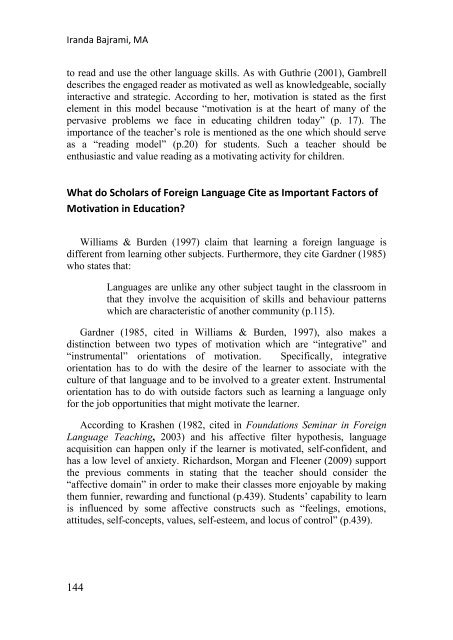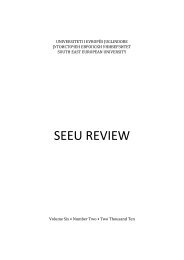SEEU Review vol. 5 Nr. 2 (pdf) - South East European University
SEEU Review vol. 5 Nr. 2 (pdf) - South East European University
SEEU Review vol. 5 Nr. 2 (pdf) - South East European University
Create successful ePaper yourself
Turn your PDF publications into a flip-book with our unique Google optimized e-Paper software.
Iranda Bajrami, MA<br />
to read and use the other language skills. As with Guthrie (2001), Gambrell<br />
describes the engaged reader as motivated as well as knowledgeable, socially<br />
interactive and strategic. According to her, motivation is stated as the first<br />
element in this model because “motivation is at the heart of many of the<br />
pervasive problems we face in educating children today” (p. 17). The<br />
importance of the teacher’s role is mentioned as the one which should serve<br />
as a “reading model” (p.20) for students. Such a teacher should be<br />
enthusiastic and value reading as a motivating activity for children.<br />
What do Scholars of Foreign Language Cite as Important Factors of<br />
Motivation in Education?<br />
Williams & Burden (1997) claim that learning a foreign language is<br />
different from learning other subjects. Furthermore, they cite Gardner (1985)<br />
who states that:<br />
Languages are unlike any other subject taught in the classroom in<br />
that they in<strong>vol</strong>ve the acquisition of skills and behaviour patterns<br />
which are characteristic of another community (p.115).<br />
Gardner (1985, cited in Williams & Burden, 1997), also makes a<br />
distinction between two types of motivation which are “integrative” and<br />
“instrumental” orientations of motivation. Specifically, integrative<br />
orientation has to do with the desire of the learner to associate with the<br />
culture of that language and to be in<strong>vol</strong>ved to a greater extent. Instrumental<br />
orientation has to do with outside factors such as learning a language only<br />
for the job opportunities that might motivate the learner.<br />
According to Krashen (1982, cited in Foundations Seminar in Foreign<br />
Language Teaching, 2003) and his affective filter hypothesis, language<br />
acquisition can happen only if the learner is motivated, self-confident, and<br />
has a low level of anxiety. Richardson, Morgan and Fleener (2009) support<br />
the previous comments in stating that the teacher should consider the<br />
“affective domain” in order to make their classes more enjoyable by making<br />
them funnier, rewarding and functional (p.439). Students’ capability to learn<br />
is influenced by some affective constructs such as “feelings, emotions,<br />
attitudes, self-concepts, values, self-esteem, and locus of control” (p.439).<br />
144

















